
Reflections on Sunbird's Flight
Share
When we first started Sunbird Rooibos in 2016, we had a plan. We created a business strategy, and some of these steps have materialised, most of it did not happen the way we planned. Creating a company requires constant adaptability to change, but never losing the vision. Our vision was to become the housebrand for premium, organically grown rooibos tea across the world - and it is happening slowly and steadily.
It requires investments to get the required certificates and required stock and supplier chain management systems to access foreign markets, and so far we have halal certificate for all our products and EU-organic certificate for our Superior range. The base tea for the Superior Range will be Fairtrade certified from next year, assuming our supplier's project goes to plan. Sunbird intends to follow on with our own certification once that is in place.
One major part of our strategy has been to add value at source in South Africa. Whereas 90% of Rooibos is exported in bulk, with value added offshore, mostly Germany, Sunbird does all its purchasing and packing locally in South Africa. This is more crucial now than ever. Covid restrictions and lack of international tourists have battered the South African economy, and Cape Town extremely hard. Political instability and unrest in Gauteng and KwaZulu Natal provinces have also contributed to instability.
Jobs are the key to help people out of poverty. We are a small company, with staff of 4 people: me, my wife Laura, Phumeza (office manager) and Vovo (packer). Our office manager was previously our young son's nanny, but we are upskilling her as our office manager. Our casual packer, we have always paid her above market rates, and we have continued to pay her during the pandemic the wages that she was earning before, despite her work being significantly less.
Although it has also been extremely challenging for them to operate during the pandemic and mini-bus taxi violence that occurred in Cape Town, we are immensely proud that our staff have been able to assume responsibility for office operations and Laura and I have been able to focus on engaging with potential international customers. With few bigger export deals in the horizon, we can hopefully then offer a full time job - and maybe 10 more people!
We have bought Rooibos tea from a cooperative owned by historically disadvantaged people (the term Historically Disadvantaged South Africans (HDSA) refers to any person, category of persons or community, disadvantaged by unfair discrimination during Apartheid). Not only are these people the inheritors of the Rooibos tradition, but the land that they work is only truly valued when it can provide a living. Rooibos is one of the most sustainable methods of doing this. Unfortunately, these areas are under threat from climate change and adverse weather. During the drought cycle of 2016-2019 there just wasn't extra Rooibos available for new customers, but we hope to source more in the buying season 2022.
Recent events have also reinforced how we all are subjected to natural whims. We began this business during acute drought, and emerged from it with a strong platform for expansion. In early 2020, we were beginning to engage with two local charities to support them and were looking abroad to find new export customers.
Yet, nature had another shock in store for us - this time one that was global. Unfortunately, our sales slowed dramatically at the onset of the pandemic, while at the same time, postponing our plans to expand internationally - our export plans are only now coming to fruition. One often hears about 'sustainability' in marketing, but a sustainable business first needs to sustain itself to have a continued positive impact.
Although there have been many unexpected lessons learned, a few principles that we hold dear have remained true. Their validity stems from their source - nature itself. We have to remain flexible in executing our strategies. Only the fittingest will survive in a dynamic environment and market place. And our strength comes from supporting those around us. We want our employers, suppliers and customers to do well. By engaging in long-term mutually-beneficial relationships upstream and down, we build a far reaching web that is resilient to outside shocks.
Where will all this take us? We're still not sure. But like any path through the wild - it's the journey, the lessons about yourself and what's around you that matter far more than the destination.
Anton
